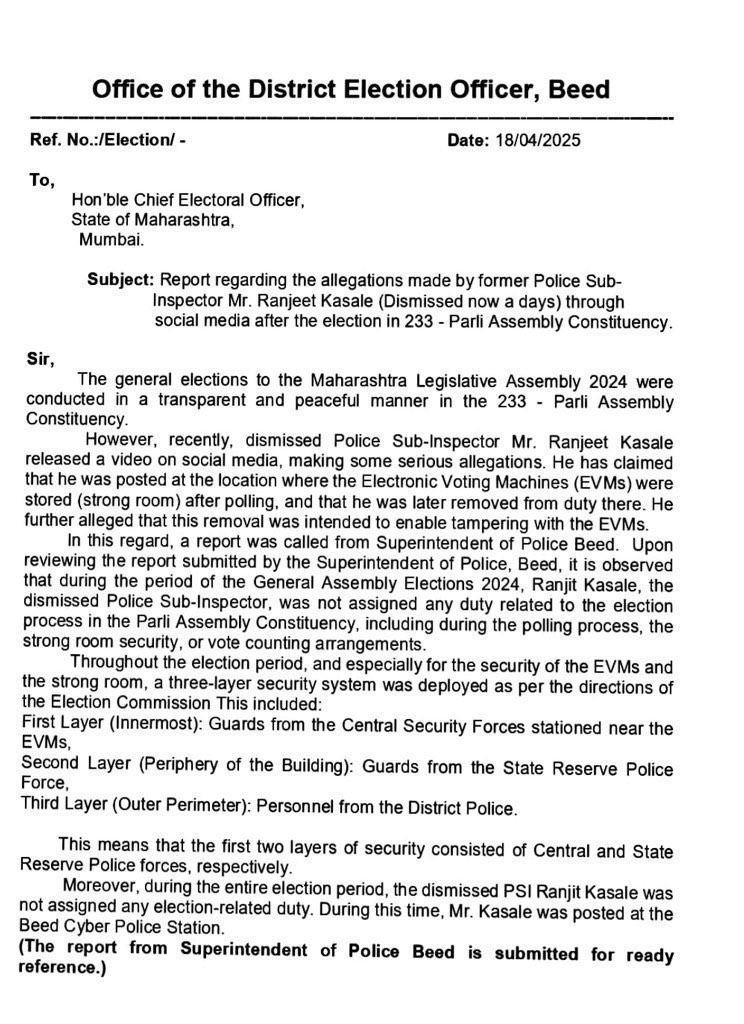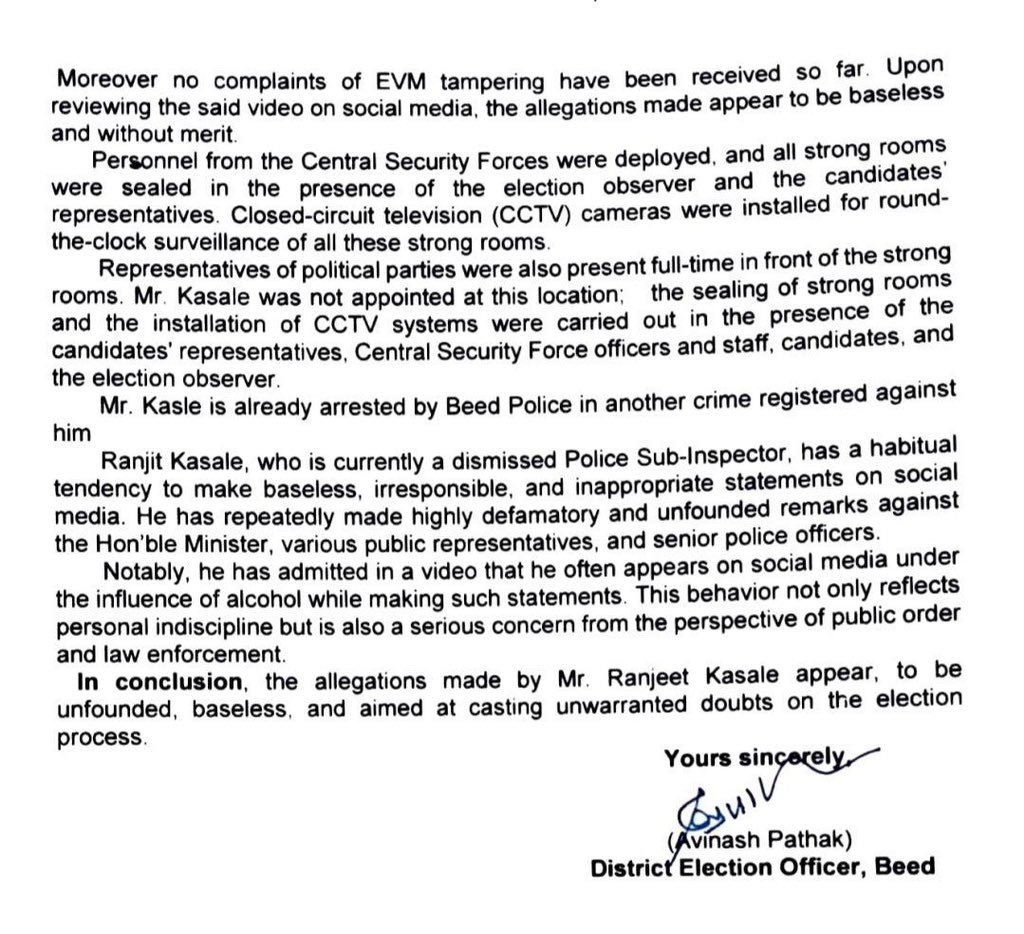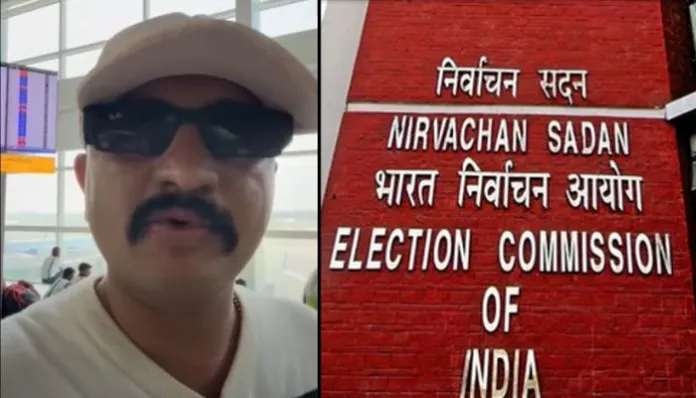In a dramatic turn of events surrounding the 2024 Maharashtra Assembly elections, allegations of tampering with Electronic Voting Machines (EVMs) have sparked intense controversy. The Election Commission of India (ECI) swiftly responded to these serious claims made by dismissed Police Sub-Inspector Ranjeet Kasle, who accused authorities of removing him from his post at a strong room to facilitate tampering. This claim gained traction after a video surfaced on social media, suggesting a deliberate conspiracy. The ECI took immediate action, seeking a detailed report from local authorities.
The District Election Officer of Beed, Avinash Pathak, refuted the allegations, emphasising that Kasle was never assigned any duty related to the elections. According to the official report, stringent security measures were implemented around the strong rooms, ensuring the integrity of the voting process.
However, questions have arisen about the thoroughness and transparency of the investigation. Critics, including political figures and journalists, have pointed out inconsistencies and omissions in the official response, raising concerns about potential political motives behind the handling of the case. With opposing narratives emerging, the controversy is far from over, leaving the public questioning the integrity of the electoral process.
ECI denied the allegations of EVM removal, called report from CEO, Maharashtra
The Election Commission of India (ECI) sought a detailed report from the District Collector and Superintendent of Police, Beed, through the Chief Electoral Officer (CEO) of Maharashtra, following serious allegations made by dismissed Police Sub-Inspector Ranjeet Kasle. Taking cognizance of the allegations, the ECI addressed the issue publicly via its official handle on X (formerly Twitter), stating: “Allegation comes from a disgruntled police officer (under suspension). Though strict legal admin. protocol in which EVMs are placed there is no possibility of removal of EVMs, report has been called from DM&SSP thro CEO considering its seriousness. Action(s) will follow the report.”
Allegation comes from a disgruntled police officer(under suspension).Though strict legal admin. protocol in which EVMs are placed there is no possibility of removal of EVMs, report has been called from DM&SSP thro CEO considering its seriousness. Action(s) will follow the report. https://t.co/XLyrHLqFX8
— Election Commission of India (@ECISVEEP) April 18, 2025
DEO, Beed refutes the allegations made by PSI Ranjit Kasle
In response to a report requested by the Election Commission of India (ECI), Avinash Pathak, District Election Officer (DEO) of Beed, submitted a detailed report to the Chief Electoral Officer, Maharashtra, on April 18. In the report, the DEO addressed a video surfaced on social media in which dismissed Police Sub-Inspector Ranjeet Kasale alleged that he was posted at the strong room housing Electronic Voting Machines (EVMs) after polling in the 233-Parli Assembly Constituency and was subsequently removed to facilitate tampering.


“In response, a report was sought from the Superintendent of Police, Beed. Upon review, it was confirmed that Mr. Kasale was not assigned any election-related duty during the 2024 General Assembly Elections. He was not involved in polling operations, strong room security, or vote counting. Throughout the election period, he was posted at the Beed Cyber Police Station and had no official role in the electoral process” stated in report
Security measures and observations of the DEO, Beed
As per the DEO, Beed, a three-tier security system was implemented around the EVM strong rooms under the Election Commission’s directives. This included Central Security Forces in the innermost layer, the State Reserve Police Force at the building perimeter, and District Police managing the outer security. Strong rooms were sealed in the presence of the Election Observer and candidates’ representatives, with 24/7 CCTV surveillance in place. Party representatives were stationed full-time outside the strong rooms, and no complaints of EVM tampering have been received.
DEO, Beed additionally mentioned that Kasale, who has a documented history of making baseless and defamatory claims on social media—often while under the influence of alcohol—has been arrested by Beed Police in connection with a separate criminal case. His statements, therefore, appear to be unfounded and aimed at casting unnecessary doubt on a process that was otherwise transparent, secure, and closely monitored.
Opposition slams BJP over explosive EVM tampering allegations
Taking a dig at the BJP over the allegations, former Chief Minister of Uttar Pradesh and Samajwadi Party Chief Akhilesh Yadav questioned the ruling party, stating, “A police officer in Maharashtra revealing that BJP members deposited ₹10 lakh into his account to facilitate EVM tampering is a massive exposé of BJP’s grand corruption.
Those who often ask ‘Who do we earn for?’ must have got their answer today.”
महाराष्ट्र में एक पुलिस ऑफ़िसर द्वारा ये खुलासा किया जाना कि ईवीएम में धांधली करने के लिए उसके खाते में भाजपाइयों ने 10 लाख रुपए डलवाए, भाजपा के महा-भ्रष्टाचार का महा-भंडाफोड़ है।
जो कहते हैं कि वो किसके लिए कमाएंगे आज उनको जवाब मिल गया होगा। pic.twitter.com/PZIO0TPHRc
— Akhilesh Yadav (@yadavakhilesh) April 19, 2025
Journalist slams Beed DEO’s report: calls it incomplete and politically motivated
Senior journalist and political analyst Raju Parulekar has raised serious questions over the report submitted by the District Election Officer (DEO) of Beed, alleging glaring omissions, contradictions, and a lack of accountability in the handling of explosive claims made by dismissed PSI Ranjeet Kasle. Parulekar has pointed out several critical concerns, questioning why the report fails to address important issues and how certain inconsistencies undermine its credibility.
10 Lakh and no answers: where did the money come from?
The report makes no mention of the ₹10 lakh allegedly received by PSI Kasle on October 21, 2024 — just a day after polling concluded. Parulekar questioned, Who gave Kasle this money? What was the purpose behind the payment? And perhaps most crucially, Why has the Election Commission of India (ECI) not initiated an investigation into this potentially damning detail? These unanswered questions loom large and cast doubt on the thoroughness of the investigation.
Smear tactics? Using dismissal to silence allegations
Furthermore, the DEO’s report seems to focus disproportionately on Kasle’s dismissal, painting him as a habitual offender. Parulekar pushed back against this narrative, raising pertinent questions: If dismissal of individuals with controversial histories is the standard, should serious allegations against figures like Amit Shah, who has been jailed, or Gautam Adani, who faces bribery accusations, also be dismissed out of hand? He argued that selectively using personal history to discredit Kasle undermines the legitimacy of the investigation and raises suspicions about political motives.
Where’s the due process? No verification of key evidence
Another glaring omission in the report, Parulekar noted, was the lack of any indication that the DEO made an effort to gather, verify, or cross-examine the evidence that Kasle reportedly possesses. Why was there no attempt to authenticate the evidence? Did the DEO cross-check this evidence with other facts before arriving at any conclusions? According to Parulekar, without proper due process and verification, the conclusions drawn by the report are not only questionable but potentially compromised.
A mockery of natural justice? Bureaucrats protecting political masters
Parulekar also accused the report of being biased and dismissive of the principles of natural justice, suggesting that the election machinery seems more focused on protecting a tainted and increasingly distrusted election process than in uncovering the truth. Is the election machinery attempting to shield political masters in Maharashtra and Delhi, rather than acting in the public interest? This raises concerns about the broader integrity of the electoral system and the impartiality of the officials overseeing it.
Suspension or dismissal? ECI and DEO can’t get their story straight
Adding to the confusion, there is a significant contradiction in the official statements regarding Kasle’s status. While the ECI’s official handle @ECISVEEP claims Kasle is currently under suspension, the DEO describes him as “dismissed nowadays.” Parulekar pointed out this glaring inconsistency, questioning whether it was a deliberate attempt to muddy the waters, and highlighting how such contradictions severely undermine institutional credibility. Why is there such confusion regarding Kasle’s official status, and what does that say about the reliability of the report?
Kasle must be heard before a judicial officer
Moreover, Parulekar emphasised the PSI Ranjeet Kasle’s safety and well-being. He urged that Kasle’s statements and the evidence he possesses be formally recorded in front of a competent judicial officer, Why has this not been done already? What is being done to ensure an independent investigation that is free from political or bureaucratic interference? Parulekar insisted that only such an approach can guarantee an impartial inquiry into the allegations.
Related:
Computer science experts question ECI’s rebuttal of Tulsi Gabbard on Indian EVMs

